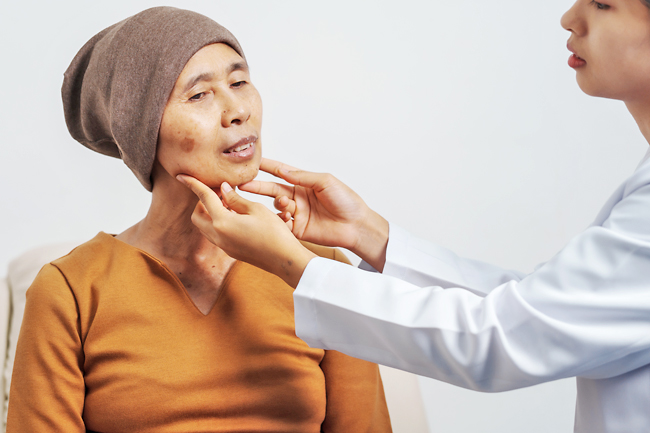ANN/THE STAR – Feeling lethargic from time to time is a common occurrence for anyone.
In fact, teenagers tend to express this feeling more frequently than adults!
However, when seniors express feelings of tiredness, sluggishness, sleepiness, weight gain, or memory lapses, it’s important not to simply brush off their complaints as typical signs of ageing. These symptoms could indicate an underactive thyroid gland, also known as hypothyroidism, which is a prevalent hormonal disorder among the elderly but can be effectively treated with proper care.
Most hypothyroid patients remain undiagnosed.
Over time, the condition can cause them to develop disability, disrupt cognitive function, and increase the risk of heart disease and death.
NOT THE FIRST DIAGNOSIS
But all these negative outcomes can be easily avoided, because all it takes is a simple blood test to check your thyroid hormone levels.
“When you see a doctor for tiredness, he might say you’ve been working too much and will probably check your haemoglobin levels to make sure you have enough red blood cells and that your kidney and liver functions are normal.



“The causes of tiredness are non-specific and checking your thyroid hormones is not something that immediately comes to mind – that’s why thyroid diseases are easily missed,” said consultant endocrinologist Professor Dr Nor Azmi Kamaruddin.
Left untreated, hypothyroidism will affect the person’s quality of life because they are lethargic for no reason.
“For weight gain, your doctor might ask you to exercise and eat less, but you’re (already) hardly eating – this is characteristic of hypothyroidism as your metabolism slows down, so your energy is not being burnt, just stored.
“It is also one of the causes of heart failure and coronary artery disease as hypothyroidism elevates cholesterol levels.
“Hormone disorders can also lead to mental health issues, and sometimes, doctors treat patients for depression for years without knowing they have an underactive thyroid.”
In comparison, hyperthyroidism or an overactive thyroid gland is easily recognised as the patient’s heartbeat is often fast and they develop palpitations.
Initially, the doctor will screen for heart disease, and once that is ruled out, they will check the thyroid next.
Professor Nor Azmi said: “With hyperthyroidism, where the body produces too much thyroid hormones, instead of being fat, patients become thin, and instead of being depressed, they become manic.”
CRITICAL HORMONE
The thyroid is a small butterfly-shaped gland in front of our throat.
It is responsible for producing thyroid hormones that control our metabolism, physical and fertility, as well as emotional well-being.
The two main hormones that the thyroid gland releases are thyroxine (T4) and triiodothyronine (T3).
They’re collectively referred to as thyroid hormones; T4 is largely inactive, meaning it doesn’t affect your cells, whereas T3 is active.
When your thyroid releases T4, certain organs in your body transform it into T3 so that it can affect your cells and your metabolism.
The thyroid also needs adequate amounts of iodine – an essential mineral you get from the food you eat – to create T4 and T3.
Causes of thyroid diseases include personal or family history; presence of antithyroid antibodies; radiation treatment to the head, neck or chest; autoimmune diseases; medications; and iodine deficiency. “Unfortunately, the prevalence of hypothyroidism is higher in females and tends to go up after the age of 55 or 60.
“Thyroid disorders may also cause similar symptoms to menopause such as tiredness, weight gain and feeling down,” said Professor Nor Azmi.
In infants, thyroid hormones are critical for brain development.
Australian, American, European and Malaysian research show that half of pregnant women are iodine-deficient, which can affect the development of the foetal brain, and lead to lower intelligence and learning difficulties in the child.
Professor Nor Azmi explained, “Pregnant women with untreated hypothyroidism have a risk of birthing a child with low IQ.
“For every month that the baby stays in the mother’s womb, they lose five IQ points, so when they are born, they’ve already lost 45 IQ points. My advice for pregnant women is to just take the supplementation, there is no need to check for iodine deficiency,” he added.
In the past, those living in indigenous settlements in Sabah and Sarawak were found to be iodine deficient, leading to a high prevalence of goitre.
ADDRESSING DEFICIENCY
This is a lump or swelling at the front of the neck caused by a swollen thyroid gland.
The iodine content of foods depends on the iodine content of the soil in which it is grown.
Seawater is a rich source of iodine, which is why seaweed, saltwater fish (such as tuna, cod and haddock) and other seafood are usually recommended to meet our iodine requirements.
This is also why populations living near the sea who consume seaweed and reef fish, like the Japanese, have a high intake of iodine, compared to populations who live near rivers, like the indigenous people in the interiors of East Malaysia.
In 2008, Sabah and Sarawak introduced universal iodisation of their water and salt supply.
A decade after implementation, data showed that the overall prevalence of goitre among school children in Sarawak was significantly lower in 2018 (0.1 per cent), compared to 2008 (2.9 per cent).







